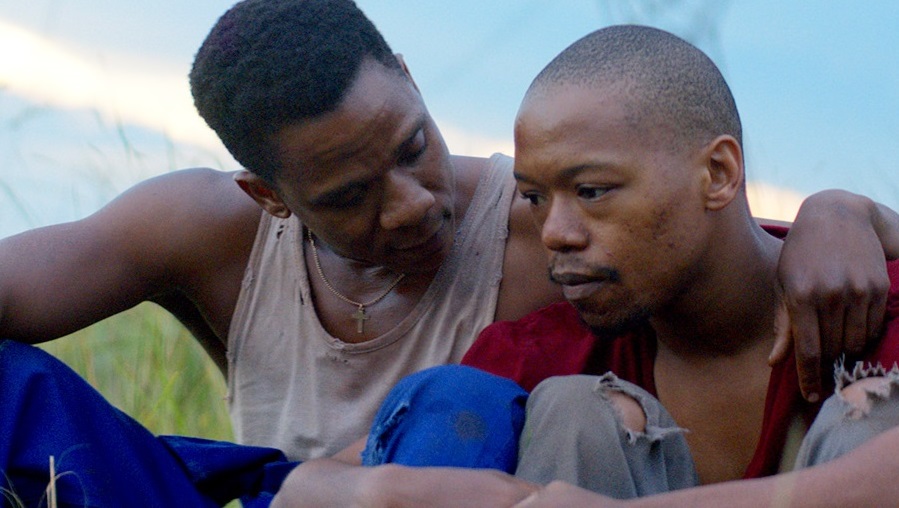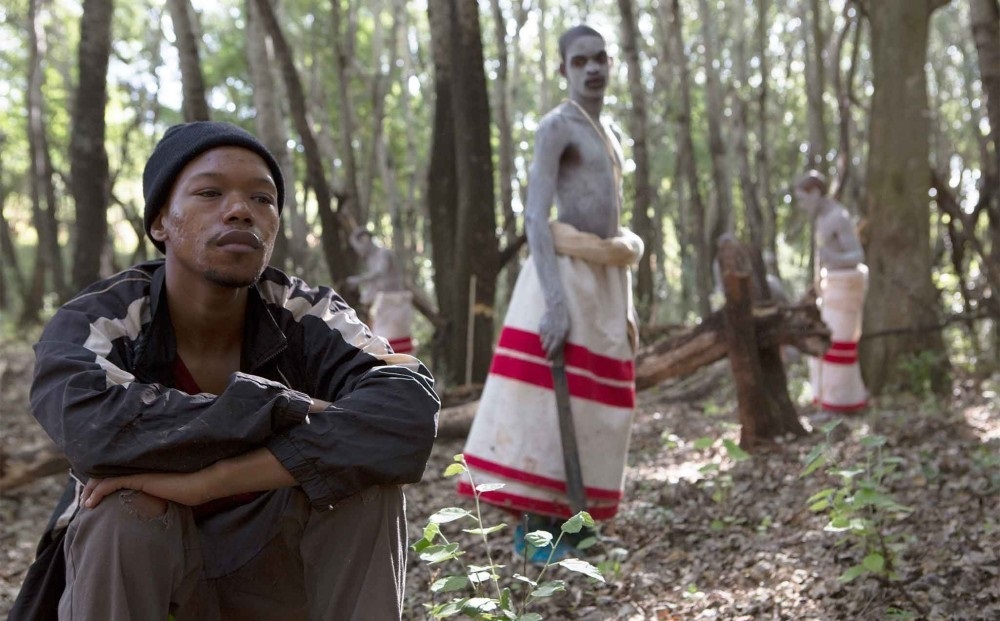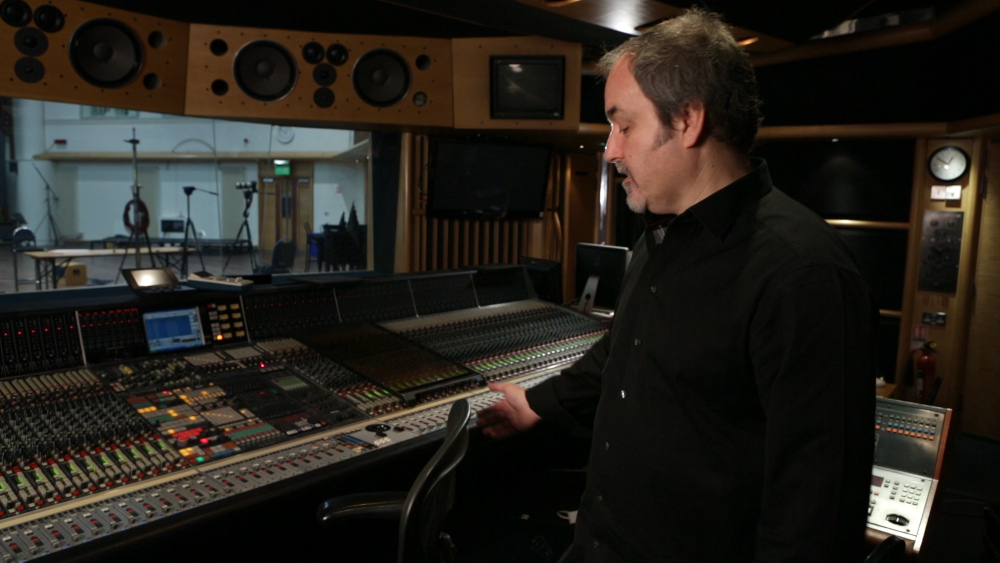Andrew Haigh: 'In the end you have to be able to make the decisions' - interview
The Yorkshire-born director on his new film 'Lean on Pete'
Very early in his career, Andrew Haigh worked as an assistant editor on such Ridley Scott blockbusters as Gladiator and Black Hawk Down. He didn't actually meet Scott in person until years later, when the eminent director had no recollection of him.
The Wound review - gay love hurts in strong South African drama
Sexual difference confronts social tradition in story set around Xhosa coming-of-age ritual
The title of South African director John Trengove’s powerful first feature works in more ways than one. In its literal sense, it alludes to the ritual circumcision, or ukwaluka, that accompanies the traditional rite of passage for young Xhosa men, and the process of healing that follows. It’s a process that sees teenage “initiates” symbolically inducted into adulthood by older men, or “care-givers”, who have themselves previously been through the experience that they now oversee.
Traditionally shrouded in secrecy, descriptions of ukwaluka are rare, the best-known that in Nelson Mandela’s autobiography, Long Walk to Freedom, where it was presented in a positive light. That hasn’t always been matched in other contemporary accounts, which have recorded darker aspects to the experience, reflecting as it inevitably does on wider issues of masculinity in society. That Trengove, a white director who is by definition far removed from his subject, approached the subject at all proved controversial in his home territory, though his co-writers include novelist Thando Mgqolozana (who treated it in his 2009 A Man Who Is Not a Man).
Director John Trengove’s insight is so much more than anthropological
The Wound adds an extra dimension to this traditional story, with Trengove centring the human dimension of his film on three characters. It opens with Xolani (Nakhane Touré) at his warehouse job in Queenstown in the Eastern Cape province: we sense the contrast between the dull routine of this everyday working life and the retreat to which he travels in a mountainous, virtually subsistence world, and how it revives him, not least for the fact that he encounters friends from the past there.
It becomes clear that the bonds linking him to his childhood friend, now fellow care-giver, Vija (Bongile Mantsai), are far closer than they appear, giving the story an overtly queer accent – except Vija, who is married and has children, seems to treat his friend as little more than a casual sexual contact, while Xolani attaches greater significance to the time they spend together. There’s a quiet sadness in Xolani, a sense that the society in which he lives precludes him creating a role for himself that might accommodate his true character. Vija represses whatever feelings he may have for his friend, whom his own self-identity concerns prohibits from treating differently, except at rare moments (pictured below). It’s another sort of wound, one inherent in a world where this kind of love cannot be reconciled in any other way. If that sounds like the scenario for a South African Brokeback Mountain, the film’s third character, Kwanda (Niza Jay Ncoyini, pictured below, in background, with Nakhane Touré), disrupts such a dynamic. He comes from a wealthy family in distant Johannesburg, a city boy brought here by his father for the toughening up that the ukwaluka promises. It's not only his trainers that set Kwanda's urban modernity apart from his fellow initiates: Xolani, who has one-on-one responsibility for the youth, easily guesses that he’s different from them in his sexual orientation, too. Kwanda stands at one remove, allowing him a degree of scepticism about the proceedings of the ukwaluka rite (in which respect he surely shares something with Trengove as outsider-director), as well as an insight into what’s going on between the two older men. The Wound draws us into this increasingly uneasy three-sided configuration, one which festers – unlike the physical wound of circumcision, which heals – with dramatic inexorability.
If that sounds like the scenario for a South African Brokeback Mountain, the film’s third character, Kwanda (Niza Jay Ncoyini, pictured below, in background, with Nakhane Touré), disrupts such a dynamic. He comes from a wealthy family in distant Johannesburg, a city boy brought here by his father for the toughening up that the ukwaluka promises. It's not only his trainers that set Kwanda's urban modernity apart from his fellow initiates: Xolani, who has one-on-one responsibility for the youth, easily guesses that he’s different from them in his sexual orientation, too. Kwanda stands at one remove, allowing him a degree of scepticism about the proceedings of the ukwaluka rite (in which respect he surely shares something with Trengove as outsider-director), as well as an insight into what’s going on between the two older men. The Wound draws us into this increasingly uneasy three-sided configuration, one which festers – unlike the physical wound of circumcision, which heals – with dramatic inexorability.
But such a bare outline does little to convey the subtlety of Trengove’s film. The director is so receptive to the power of images and intonations over words, and his spare style comes close to that of Dogma in its fluid, frequently handheld camerawork (barring a couple of slow-motion sequences) and a rigorous avoidance of external effects (musical incursions are minimal).  There may be big landscapes aplenty in the surroundings, but Paul Özgür’s widescreen cinematography is memorable for its intimacy. Visual elements of Xhosa tradition – the contrasted colours of the initiates’ loincloths, their white body paint (main picture) – aren’t exaggerated, but the film engrosses us in its (for the great majority of its viewers, anyway) unfamiliar world. You guess that making the film must have been a broadly collaborative process, and Trengove’s insight is so much more than merely anthropological (though The Wound certainly feels true on that level, too). Most of all, he has drawn performances from his main trio that may seem at first understated, but in which his characters come to inhabit their roles absolutely. Pared down almost to silence by the end, Nakhane Touré as Xolani proves emphatically that less can be more. You could say exactly the same about the film as a whole: The Wound impresses for its raw, incremental power.
There may be big landscapes aplenty in the surroundings, but Paul Özgür’s widescreen cinematography is memorable for its intimacy. Visual elements of Xhosa tradition – the contrasted colours of the initiates’ loincloths, their white body paint (main picture) – aren’t exaggerated, but the film engrosses us in its (for the great majority of its viewers, anyway) unfamiliar world. You guess that making the film must have been a broadly collaborative process, and Trengove’s insight is so much more than merely anthropological (though The Wound certainly feels true on that level, too). Most of all, he has drawn performances from his main trio that may seem at first understated, but in which his characters come to inhabit their roles absolutely. Pared down almost to silence by the end, Nakhane Touré as Xolani proves emphatically that less can be more. You could say exactly the same about the film as a whole: The Wound impresses for its raw, incremental power.
Overleaf: watch the trailer for The Wound
DVD/Blu-ray: They Came to a City
A Priestley experience - stagey but fascinating wartime social fantasy
Ealing Studios veteran Basil Dearden may have directed it, but 1944’s They Came to a City is mostly a JB Priestley film, an engaging blend of the mundane and the metaphysical.
Milos Forman: 'The less you know about yourself, the happier you are'
An encounter with the Czech director who went into exile in 1968 but kept challenging authority
The second thing I noticed about Miloš Forman, who has died at the age of 86, was the spectacular imperfection of his English. All those decades in America could not muffle his foghorn of a Bohemian accent, nor assimilate the refugees from Czech syntax.
Blu-ray: Andrey Zvyagintsev - The Return / The Banishment
The first two films from the Russian master of the human abyss
Andrey Zvyagintsev is without doubt one of the great film-makers of our time. If you only know Leviathan, it's about time you looked at the rest of his considerable oeuvre. What is it about Russian cinema?
Custody review - unflinching and masterful
Brilliant family drama heralds a new voice in French cinema
Divorce proceedings turn sour in this devastating debut from writer/director Xavier Legrand. Using the full palette of human behaviour, Custody expertly balances high tension and grounded realism to create a timely and lingering film.
DVD/Blu-ray: An Actor's Revenge
Japanese fascination in stage story told with overlapping plot strands, distinctive doubling
Japanese director Kon Ichikawa’s An Actor’s Revenge is something of a one-off. Even in the context of the prolific director’s career variety, it’s an unusually stylised and visually captivating story of high artifice – there’s rich melodrama in its kabuki emotional playing and theatrical setting – that is set against the lowlife criminal comedy of 19th century Tokugawa Tokyo, or Edo as it was then known. Rich and strange, indeed.
Score review - breathless dash through music and film
Fascinating but frenetic documentary celebrating movie composers
The crucial yet almost indefinable role of music in film – it’s a subject ripe for exploration and celebration, from the musicological technicalities of leitmotifs and ostinatos, through to the colourful characters working to bring directors’ sometimes vague musical notions to sonic reality. All of which gets raced through in this jam-packed documentary by first-time director Matt Schrader, a somewhat frenetic, 93-minute dash through the subject.
Schrader has clearly put in a massive amount of work, and Score is very much a labour of love. He’s amassed dozens of interviews, with remarkable access to what seems like every major Hollywood film composer working today, plus directors, film company executives, even Moby and Kalamazoo psychology professor Siu-Lan Tan, offering their expertise on the science and emotional impact of music. Schrader sets out to trace the history of film music – from silent movies to the development of orchestral scores, 1960s experimentalism, 1970s punk and electronica, and the re-emergence of the big orchestral sound. And he intersperses his pithy history lessons with chapters on everything from favourite recording venues to the stress caused by unrealistic deadlines, from wacky instruments to the wonders of electronic sound manipulation.
In true Reithian fashion, there’s plenty here to inform, educate and entertain. But if all that sounds like a lot to digest in just 93 minutes – well, it is. Schrader’s somewhat breathless pace means that many of the areas he tackles hardly get a mention before he’s dashed on to his next subject. A promising exploration of the demands placed on orchestral musicians – who are expected to sightread from scratch for live takes – is curtailed after just a few seconds, for example, while tales of the ghosts of London’s Air Studios from composer David Arnold (pictured below) are disconcertingly allowed far more time. With his mass of interviews, too, Schrader seems determined to be scrupulously fair in giving speakers roughly equal air time – with the unfortunate result that several more minor figures spend quite a bit of time saying not much at all. Okay, he does focus on a handful of major composers for deeper exploration – John Williams, Jerry Goldsmith, Thomas Newman and Hans Zimmer – and Zimmer, in particular, is refreshingly candid in expressing his insecurities over where his next music will even come from. Disney executive Mitchell Lieb, too, seems caught off-guard when revealing that each of the company’s movies costing ‘close to half a billion dollars’ to make, with inevitable financial fallout for everyone involved – not least the composer.
With his mass of interviews, too, Schrader seems determined to be scrupulously fair in giving speakers roughly equal air time – with the unfortunate result that several more minor figures spend quite a bit of time saying not much at all. Okay, he does focus on a handful of major composers for deeper exploration – John Williams, Jerry Goldsmith, Thomas Newman and Hans Zimmer – and Zimmer, in particular, is refreshingly candid in expressing his insecurities over where his next music will even come from. Disney executive Mitchell Lieb, too, seems caught off-guard when revealing that each of the company’s movies costing ‘close to half a billion dollars’ to make, with inevitable financial fallout for everyone involved – not least the composer.
Perhaps understandably, Schrader also remains frustratingly light on the technical details of the music itself. Howard Shore moves towards discussing the leitmotifs that structure his Lord of the Rings scores, and Schrader introduces some clever animated sequences showing how the Tolkein characters’ themes evolve across the trilogy. There’s mention, too, of the ubiquitous ostinatos of Zimmer’s repeating string patterns, and of the subtly innovative textures he generates. But Score could do with a lot more discussion of how composers achieve their effects – and whether successful film music is all about simply going for the most obvious emotional hook.
The film leaves quite a lot of unanswered questions, in fact – how directors even choose their composers, for a start; how composers interpret or adjust their music to suit directors’ demands; and why scores simply get ditched at the last minute (as, according to the movie, they often do). A bigger frustration is that Schrader sticks so unvaryingly to mainstream Hollywood movies, as if that’s all there is – or at least all that matters. What about the music written for Soviet cinema, or Toru Takemitsu’s copious scores for Japanese films? Or, aside from Spielberg and Williams, those director/composer partnerships that develop across several films – Peter Greenaway and Michael Nyman, or Paul Thomas Anderson and Jonny Greenwood?
It’s not that Schrader’s film isn’t well structured. There’s always a clear sense of where you are, and he jumps nimbly from subject to subject in a way that’s always entertaining. It’s just that his focus is so mind-bogglingly broad that it feels like little is covered in sufficient depth, and his relentlessly frenetic pacing makes the film feel – bizarrely – both rushed and overlong. Score is a hugely ambitious undertaking (probably far too ambitious, in fact) and it’s never less than stimulating and rewarding. But there’s little chance of coming away from it with much more of an awareness of how and why a movie’s music affects you. It seems like it’s aimed at an audience who both love film music and know very little about it – which, given the obsessive dedication many film music fans display, is rather an unlikely combination.
Overleaf: watch the trailer for Score
Ready Player One review - Spielberg goes back to the future
Thrilling cyber-universe puts drab real world in the shade
Suddenly Steven Spielberg movies are plopping off the production line like Ford Fiestas or Cadburys Creme Eggs. It seems like only seconds ago that we were greeting The BFG and the breast-beating earnestness of The Post, and now the director comes steaming back with this huge and hectic tribute to the gamer-world and his own long-lost youth.
